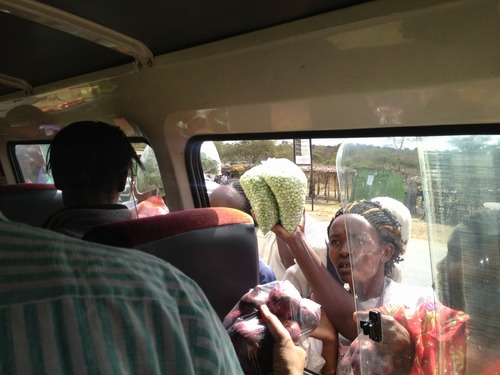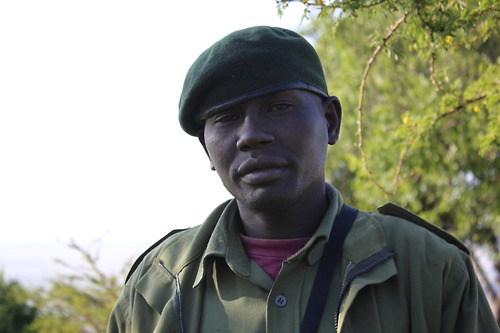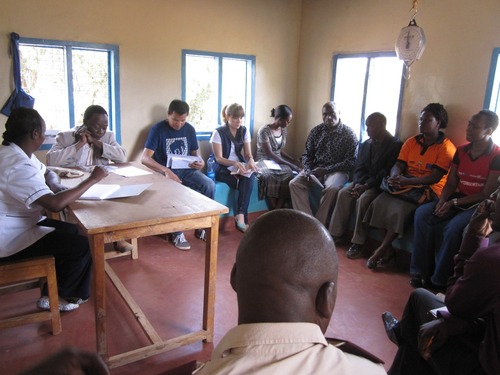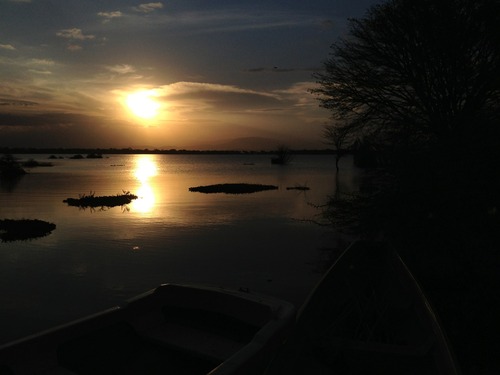Navigating Kenya to Make a Sustainable Impact
Kimberley Mark, MBA ’14, writes from Nairobi, Kenya, about summer project with Accenture Development Partnership (ADP) to improve the state of learning across Kenya with mobile technology.
Sasa from Nairobi
by Kimberley Mark, MBA ‘14 (8/19/13)

Navigating my way through a developing country, on a mission to create a sustainable impact in some of Africa’s poorest communities.
I had yellow fever.
Less than three days after receiving my yellow fever vaccination I developed the debilitating sickness. My brother even started calling me patient zero. It turned out to be a simple respiratory infection, but I thought that would catch your attention and be a good way to start this article.

After 24 hours of travel I finally landed in Nairobi. Having slept only 45 minutes throughout the trip, I was glad to be in Africa. I purchased a cheap phone (that I still don’t know how to work), exchanged what few dollars/yen/won/euros/dirhams I had to Kenyan shillings, and proceeded to passport control. Twenty minutes later I was riding into central Nairobi. The city streets were plagued with heavy traffic. But it was there, sandwiched between matatus which were spewing exhaust and overflowing with people, that I had my first glimpse of African wildlife. I could just make out the tall, elegant silhouettes of giraffes on the horizon. My driver, who was less than excited at this, struck up a conversation about Nairobi and quickly told me his must-do-must-see list which consists of heading to a local bar.
Other than the giraffes, I was surprised at how similar Nairobi feels to NYC. And yet with the exclusion of a Halle Berry cosmetics billboard, nothing resembled the city I had just left. There were little signs all around that I was not in the west anymore; the lights dimmed in and out, the internet was intermittent, I brushed my teeth with bottled water for the first two weeks, and I started every day with my antimalarial pill.
On my first night, dinner consisted of a large amount of Ethiopian food, shared with a group of five other consultants. We listened to a local band and inhaled the smoky incense that constantly burned in the restaurant. Our waiter danced in what I can only assume is an Ethiopian style, full of mad shoulder popping and spastic twitching. We talked throughout dinner about the trips we would take over summer and the impact we hoped our projects would have. Despite the exhaustion from my trip, I was happy to be there.
After dinner the men in our group debated how to get back to the hotel. I overheard one say, “There are four of us. We will probably be okay to walk the few blocks back. But she (meaning me) needs a cab.” My hotel was no more than a block away from the restaurant. My cab driver that night nicknamed me “Njeri” (JEH-ree), meaning daughter of a warrior in Kikuyu. But having to be escorted one short block back to the hotel did not make me feel like a warrior’s daughter. Feeling secure, but understanding that you are not, is an odd sensation.

In the US we’re accustomed to working escalators, traffic laws, and cities that are fairly organized and uniform. Logic permeates nearly everything, but sometimes the adventure is lost within the comfort of that logic. This summer I didn’t have the security of NYC’s organized streets or Zagat ratings, but I learned to navigate Nairobi’s crowded roads. I didn’t have my old friends, but I made new friendships with Maasai warriors and genocide survivors. I couldn’t commiserate with my peers over five hour flight delays out of Newark, instead I had to adapt to more permanent delays caused by the Nairobi airport burning to the ground.
I also acquired a unique set of skills: how to ward off street merchants in Swahili (“sina hitaji”), shake hands like a local Kenyan (with a variation of a hand and thumb grab), choose the best cut for nyoma choma (the freshest ribs), and defend myself from feral cats (should all else fail, surrender the food and slowly back away). I will miss all of these things – maybe not the feral cats, but everything else.
Whether because or in spite of its history, the air in Africa is full of exhilaration and excitement. Progress is everywhere, from the laying of electric lines in the depths of the Mara to the rise of buildings in the heart of Nairobi. And yet adjacent to the city’s stunning accomplishments, there are people whose daily lives have changed very little over the last 50 years. In the shadows of Kenya’s cities are places where women still carry bundles of kindling and several gallons of water on top of their heads, barefooted children are charged with herding the livestock, and mobile phones are more common than running water.

My summer project with Accenture Development Partnerships (ADP) worked in and with these communities. In collaboration with the African Medical and Research Foundation (AMREF) and several commercial firms, ADP embarked on a mission to improve the state of learning across Kenya with mobile technology. During the course of my project, it has become clear just how much Johnson has prepared me for success. The Sustainable Global Enterprise immersion taught me how to look at a wider system of issues and tackle a consulting project in a methodical way. The Management Cases class prepared me to build issue trees and consulting decks. I spent countless hours over the last year practicing for case interviews, pouring over HBS cases, and stressing over the coveted closed list for job interviews. But I can now say that all of that time and effort was well worth it.
Now that I’m almost finished my internship, I don’t know what waits for me when I land back in the US. My time in Kenya has been full of uncertainty, adventure, and stories that will only make sense to people who have spent time in Africa. Looking forward, I can only hope that the upcoming year will be as exciting, inspiring and challenging as the previous.
I end this entry with one piece of advice, “Jambo” is a Swahili greeting used almost exclusively by tourists. Locals prefer the slang “Sasa.” So if you ever find yourself in Kenya, remember to say “Sasa!” when you greet people and you’ll fit right in.

